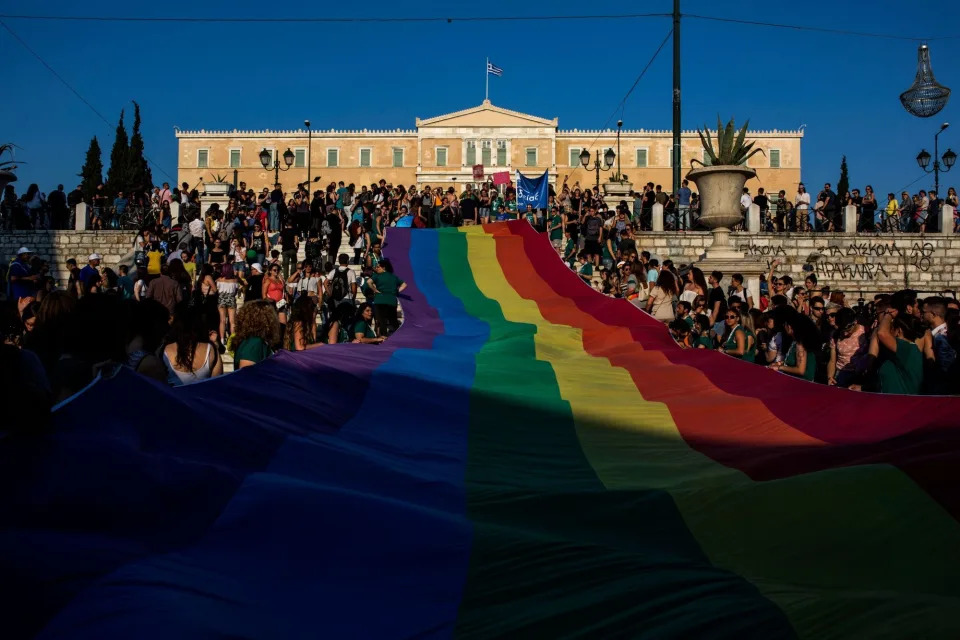

Paul Tugwell and Eleni Chrepa
Wed, Jun 12, 2024,
(Bloomberg) -- Greece is shifting the focus of its LGBTQ rights agenda to changing attitudes rather than legislation, Greek Prime Minister Kyriakos Mitsotakis said, a blow to activists hoping for further reform after a landmark same-sex marriage bill was introduced earlier this year.
Long-demanded by Greece’s LGBTQ community, the introduction of marriage equality was “courageous” and “the right thing to do” although it did come with “some political consequences,” the Greek premier said in a Bloomberg interview on Wednesday at the prime minister’s office in Athens.
While Mitsotakis’s center-right New Democracy party came first in Sunday’s European Parliament elections with 28.1% of the vote, that was below the 33% share he secured in 2019, a drop partly attributed by Mitsotakis to some traditional supporters moving away from the party as a result of the same-sex marriage bill. Far-right parties collectively increased their share of the vote to 16.7%, up from 9.1% five years ago.
Greece’s Parliament voted in February to extend equal marriage and automatic parental rights to all of the country’s 10.5 million citizens, and to allow same-sex couples to adopt, a defining moment for Mitsotakis’ center-right party. Even after winning a landslide election in June last year, he had to rely on support from the center-left and leftist opposition parties to pass the measure amid resistance from parts of his own party as well as the influential Greek Orthodox church.
The move, which made Greece the first majority Christian Orthodox country to take the step, was “consistent with what we said we wanted to do before the elections” and “a landmark of what we did for the community,” he said.
Yet that move is likely to be the defining legislative action for Mitsotakis’s LGBTQ agenda, the premier said. Activists hoped instead it would be a first step before making further meaningful changes, such as extending surrogacy rights to male couples.
“It’s not so much a question of legislation, it’s a question of really making sure our discourse is non-discriminatory which is not easy in any country, especially when you have a resurgence of the far right,” he said.
A specific focus of that strategy starts at schools, with teacher training forming part of an anti-bullying strategy. While people can have different views over marriage equality, “I’m sure no one can accept a teenage being bullied because of their sexual orientation,” Mitsotakis said.
The plan to elevate women
The equality agenda also extends to other issues, most pressingly tackling the low participation of women in the labor force, an issue plaguing nations across Europe. Part of the prime minister’s solution is tackling the pay gap and also promoting more women in politics, the prime minister said.
While the male participation rate in the Greek labor market is 84.4%, close to the European Union average of 85.2%, the country falls much further behind for women, with only 67.2% actively participating in the labor market, according to Eurostat data for 2023. That puts them in the bottom three EU countries for this metric.
“A lot of it has to do with family balance and encouraging women to work and feel comfortable that children will be taken care of,” he said.
The premier hopes that part of the solution will be addressed through the introduction of a one-time cash payment for each child born — also an attempt to tackle the problem of having an ageing population. Mitsotakis’s government raised this benefit at the beginning of 2024, a measure he first introduced in 2019, from €2,000 ($2,165) to as much as €3,500 depending on the number of children born in a family.
Sign up for the Equality newsletter for weekly reporting from Claire Suddath on how gender, race and class are shaping capitalism in America and beyond.
Most Read from Bloomberg Businessweek
No comments:
Post a Comment